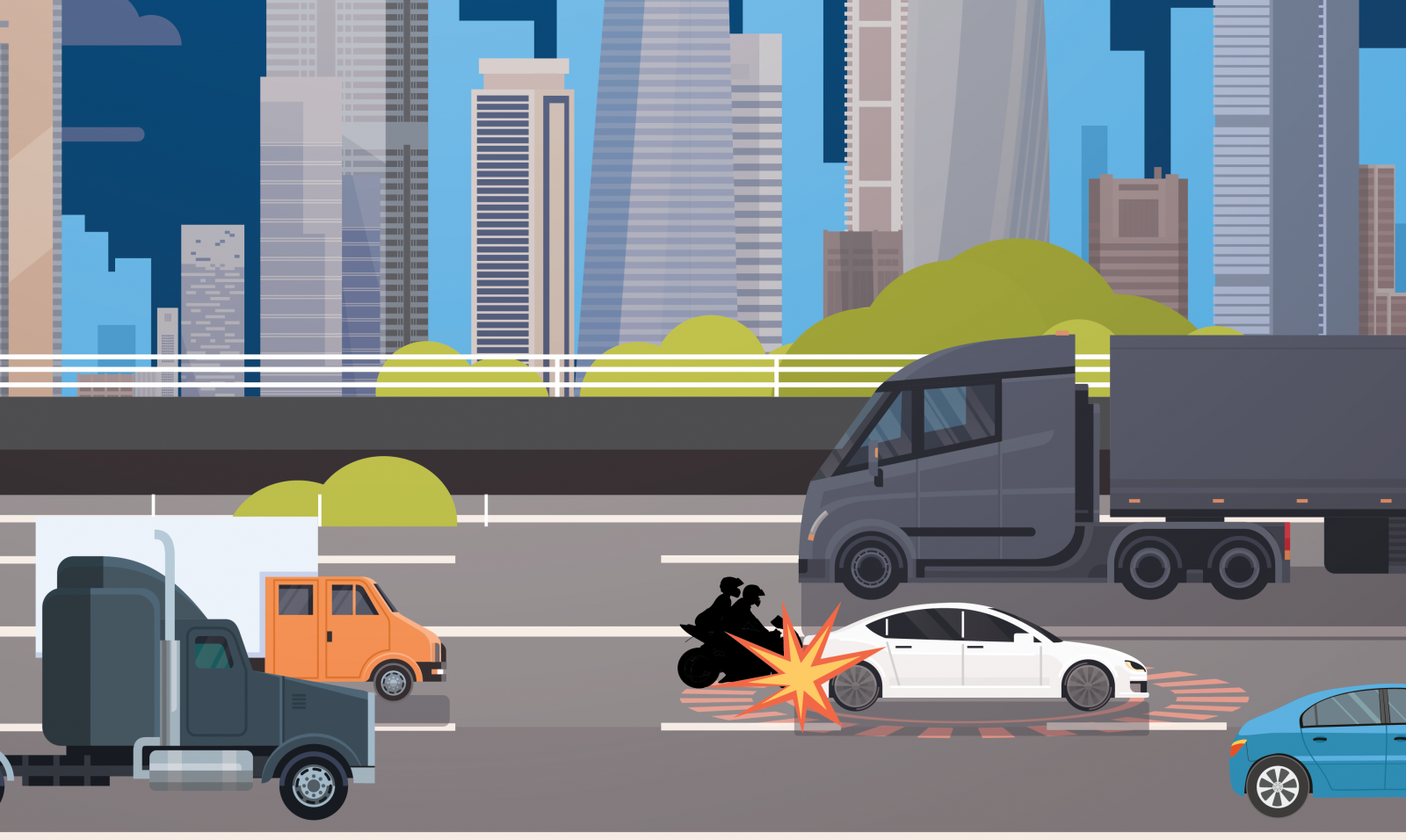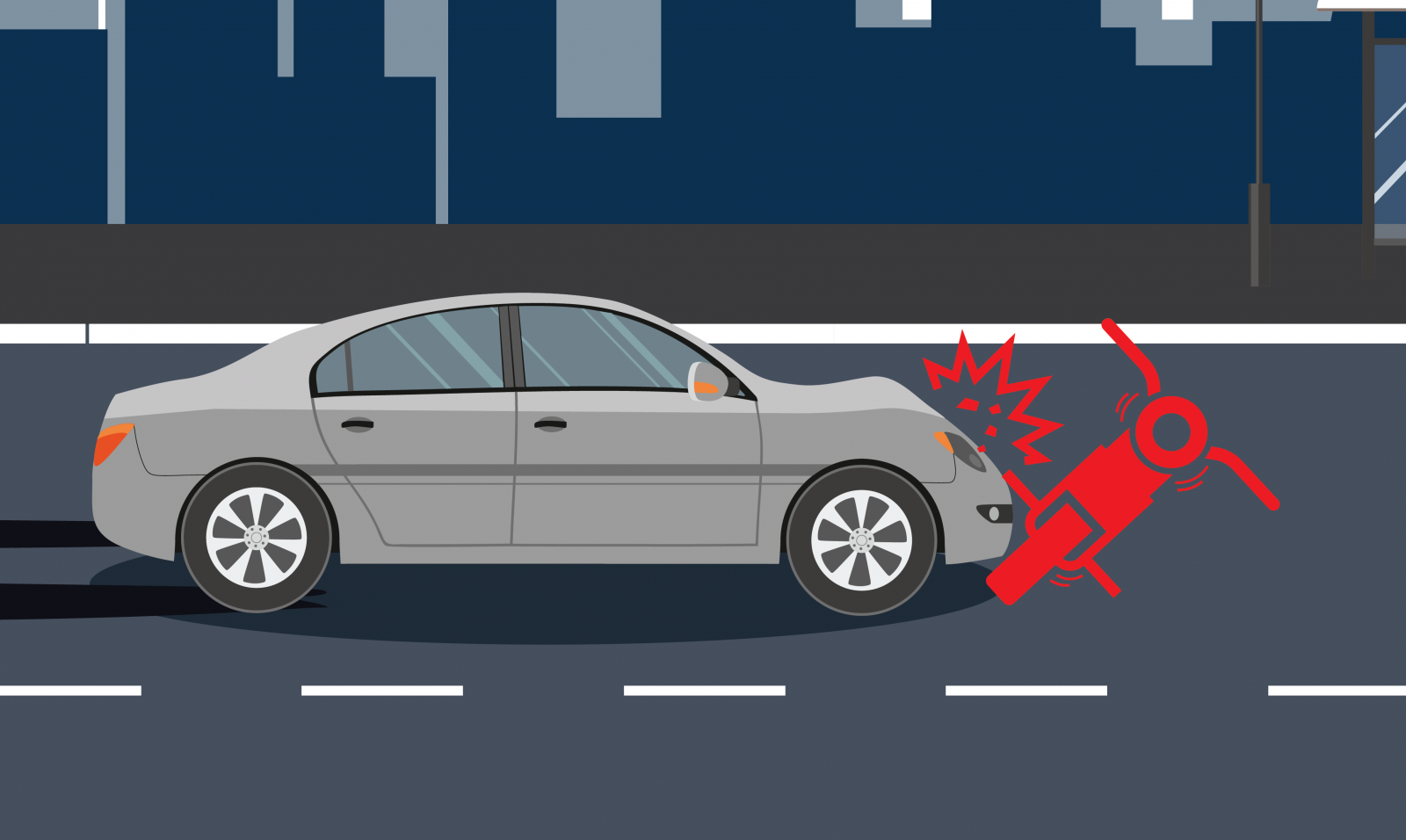Key Points:
- It is not uncommon for negligent, at-fault car and truck drivers to blame motorcycle riders for an accident.
- It is important to gather evidence as quickly as possible after the crash. The longer evidence goes without being collected, the more likely it will be difficult or even impossible to find later.
- Evidence that can help win a motorcycle accident case includes witness testimony, 911 audio recordings, phone and driving records, and medical records that explain your injuries.
- Compensation can be recovered for medical bills, lost wages due to an inability to work, and pain and suffering.
Evidence Most Often Utilized in Motorcycle Crash Cases

After a motorcycle accident, you may find that the at-fault driver or their insurance company is reluctant or unwilling to accept blame. They may even try to pass the responsibility on to you.
While it can be frustrating to deal with, among the other hardships that come with being in an accident, there are various sorts of evidence that can help prove your case and establish the other driver’s fault.
It’s crucial to begin collecting evidence as quickly after an accident as possible, as it often becomes more difficult or even impossible as time goes on.
Here are the types of evidence that will need to be collected for your motorcycle accident case.

Evidence That Can Prove Cause or Fault
Various types of evidence that may prove how the accident happened and how the other driver may have been negligent are essential to your case.
Here are common pieces of evidence that can help:
- Police reports and crash diagrams from responding officers
- Documentation from EMS, EMT, or fire department officials who were called to the scene
- Pictures or videos of the accident scene taken by you, the police, and/or witnesses to the accident
- 911 audio recordings of motorists who called the police to report the crash
- Photos of the roadway, road conditions, traffic signs, obstructions, and intersections near the crash scene, which can help show how or where the accident occurred
Evidence and Records from the Other Driver
While some information, such as contact and car insurance info, may have been easily obtained from the other driver at the scene of the crash, additional documentation may be harder to collect – but not impossible.
Examples of records that may be necessary to obtain include:
- Cell phone records from the other driver. This information is particularly valuable in proving distracted driving negligence and liability. These can show if a driver was texting or talking on the phone just before the accident.
- Driving and employment records of the other driver, especially if they were working at the time of the accident. If so, their employer may be at least partially responsible for paying for your injuries.
- The arrest records or criminal history of the other driver.
Evidence of Your Injuries
Evidence that shows the harm you suffered as a result of your accident is critically important to a personal injury case. The severity of your injuries and whether they will permanently affect your life can help determine your case’s value.
This evidence can include:
- Emergency room records
- Testimony or reports from treating physicians
- Expert testimony or documentation about the type of injury you sustained
- Medical evidence, such as x-rays, MRIs, or CT scans
- Documentation of physical therapy or rehabilitation
- Previous medical records that can show you were uninjured before the accident
Financial and Emotional Evidence
Records of physical injury are not the only source of proof that you were harmed in a crash. Evidence beyond physical damages can be used to explain how the accident has affected your life in other areas as well.
These records can include:
- Proof of lost wages if you have been unable to work due to the accident
- Evidence that you can no longer continue working due to physical restrictions or inabilities
- Evidence of pain and suffering
Witness Testimony
Another very important form of evidence that can often be forgotten is witness testimony. Witnesses who are not a party to the case in any way can be especially beneficial because they do not have a stake in the outcome.
These witnesses can often offer unbiased accounts of what happened, including the approximate speed of the cars, whether a driver seemed distracted, and what happened in the direct aftermath of an accident when adrenaline and tempers may have clouded the judgment of those involved.
But those who saw the crash are not the only witnesses that can help prove your case. Character witnesses (also known as before-and-after witnesses) can also be brought to trial to help prove the pain, suffering, and limitations a motorcycle rider has experienced after a severe crash.
Frequently Asked Questions About Motorcycle Crash Evidence
Can Damage to the Motorcycle Be Good Evidence in a Motorcycle Case?
While physical damage to your motorcycle can sometimes be good evidence for a case, this does not always demonstrate the severity of the accident. For instance, you could be severely injured in an accident, yet your bike may have only sustained minor scratches.
However, if there is severe damage to the bike, it is critical that you take photos to document and, if possible, delay repairing it to preserve it as evidence.
An experienced motorcycle accident attorney will be able to help you prove your injuries, whether your motorcycle damage matches the severity of your injuries or not.
What Is the Hardest Type of Evidence to Collect in a Motorcycle Accident Case?
While vital to a motorcycle accident case, witness testimony can be the hardest type of evidence to collect. This is because although witnesses will often call 911 to report an accident for assistance, many do not wait for first responders to get to the scene. This can make it difficult to track down witnesses to obtain additional information or testimony for a case.
Can Lawyers Help Find More Motorcycle Accident Witnesses?
An experienced motorcycle accident lawyer knows how vital witnesses can be to a case. Therefore, they will do everything they can to find as many witnesses as possible.
Attorneys can use several techniques to find additional people who saw the accident occur, including:
- Reviewing police and/or first responder reports to determine people who may have stopped or called 911
- Reviewing surveillance video from traffic cameras and/or local businesses
- Reviewing the drivers’ social media for mention of the accident and anyone who may have seen the crash or know of the driver’s condition
Having good evidence for a motorcycle accident case is essential, whether your case can be settled through negotiations or it must go to trial.
The stronger the evidence you and your lawyer gather, the stronger your negotiating position is and the more likely you are to reach a favorable settlement.
A Georgia Motorcycle Accident Case Study
How Eyewitness Testimony Helped a Macon Police Officer Win His Case

In one Georgia motorcycle crash case, an officer from the Macon Police Department was hit and injured while driving his motorcycle as he responded to the scene of an accident.
Witnesses to the officer’s crash stated that he had his blue lights flashing and siren going when he approached the accident to which he was responding. When he crossed the centerline to render aid, he was hit by a driver who failed to stop in the oncoming lane of traffic.
As a result of the collision, the officer suffered a fractured shoulder that required two separate surgeries.

 1201 West Peachtree Street #2339 Atlanta, GA 30309+1-770-212-3795$0-$100000
1201 West Peachtree Street #2339 Atlanta, GA 30309+1-770-212-3795$0-$100000In a city where you can get into an accident at any moment, the Miller Law Firm provides exceptional service to Atlanta drivers like myself during a wreck.

Conflicting Stories at Trial
The officer sued the driver who hit him for negligence and failure to yield to an emergency vehicle. The defendant driver claimed that he was not responsible because the officer did not signal that an emergency was occurring and was speeding at the time of the collision.
At trial, independent witnesses testified that the officer did indeed have his lights flashing and siren on at the time of the crash. This testimony led the jury to disagree with the defendant and awarded the officer $20,000.
Questions Answered:
- What types of evidence can be used in a motorcycle accident case?
- Can I get compensated for my lost wages after a motorcycle accident?
- Is witness testimony essential in a motorcycle accident case?
- Are police reports important in a motorcycle accident case?
- Can I be compensated for pain and suffering in a motorcycle accident case?
- What Is the Hardest Type of Evidence to Collect in A Motorcycle Accident Case?
- Can Lawyers Help Find More Motorcycle Accident Witnesses?










